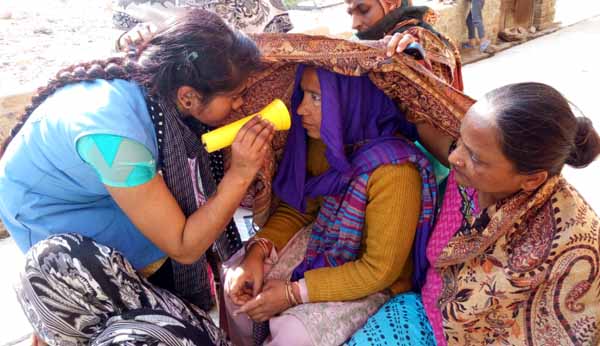At Operation Eyesight, we are committed to providing the best for the poorest in quality eye health care on a sustainable basis. What does that mean? It means that we want to make sure the people we help can continue to receive the care they need and deserve, even after we’ve moved on to run other projects. One way we do this is by incorporating the United Nations’ Sustainable Development Goals (SDGs) into our work.
One example of this is Shashi (pictured above). She lives in a small village in Delhi, India in a small semi-concrete house, which she shares with her family.
She is unmarried and lives with her mother and her two brothers. Her eldest brother is running a small clothing shop, and what he makes from his work there he puts toward supporting the family. Unfortunately, Shashi’s family still faced a great deal of financial challenges.
Shashi wanted to do something to help financially, and she heard about Operation Eyesight. When she heard that they were training Community Health Workers to go door-to-door and screen them for eye health issues, she knew right away that she wanted to be a part of it.
Shashi had a hard time finding the job. When she did, her family wasn’t immediately supportive. Many women in India are not encouraged to work, but after she was hired, her family was counselled on the importance of the work she would be doing, and the financial benefits it would bring. Finally, Shashi’s family agreed that she could do the job (SDG #5: Gender Equality).
“It’s great work. I always wanted to help people in need in my community. This was my first time working with so many people, and at first I had trouble convincing the people about the importance of their eye health, especially when it came to eye surgery. It took time, but as people were treated, I started receiving appreciation from the patients who were helped and that was a great boost to my confidence” (SDG #3: Good Health and Well-Being).
Community health work is hard and involved work. Not only do health workers perform initial screenings, they also follow up with patients. Thanks to Shashi’s dedication, the people in her community have developed awareness about the importance of eye health as well as general healthcare (SDG #4: Quality Education).
Now people happily welcome her into their homes, trusting that she can help them.
“The work is very rewarding. There was one patient I helped who had cataract in both eyes. After counselling her about cataract surgery and referring her to the partner hospital for treatment, her sight was restored (SDG #17: Partnerships for the Goals). She was so happy! Now she has become an advocate for eye health, and her quality of life has been much improved.”
While Shashi’s mother was initially hesitant to allow her to work, she is now so proud.
“My daughter is working for a noble cause and helping people by referring them to be cured from avoidable blindness! I couldn’t be happier. Thanks to Shashi, our family is financially supported, and we are respected by our community.”
Shashi has decided that once she is done working as a community health worker, she wants to study to get a degree and become a social worker, with a focus on community development.
“This job has built my image as a social worker in the community. People respect me, they consult me when they have any eye-related issues. People now call me doctor!” Shashi says smiling. “It has also helped my family financially. I’m happy I can support my family and bring us out of poverty (SDG #1: No poverty). I would like to thank everyone who has made this possible, including Operation Eyesight and the generous donors who provided me with a great opportunity to work to help my community. It’s always been my dream!” (SGD #10: Reduced Inequalities).
The best part of it all is that it’s generous people like you who make our work possible. Your support is helping thousands see hope for the future, and is giving them a chance to break the cycle of poverty and build themselves a brighter future!
There are still so many people who need our help. By donating to our Screening and Outreach programs, you can help us train more dedicated health workers like Shashi, and restore sight to those who need it most – For All The World To See!

